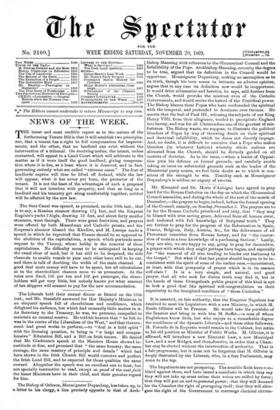The Bishop of Orleans, Monseigneur Dupanloup, has taken up, in
a letter to his clergy, a line precisely opposite to that of Arch- bishop Manning with reference to the (Ecumenical Council and the Infallibility of the Pope. Archbishop Manning, assuming the dogma to be true, argued that its definition in the Council would be opportune. Monseigneur Dupanloup, making no assumption as to its truth, though his tone seems to intimate an adverse opinion, argues that in any case its definition now would be inopportune. It would drive schismatics and heretics, he says, still further from the Church, would provoke the mistrust even of the Catholic Governments, and would revive the hatred of the Pontifical power. The Bishop blames those Popes who have confounded the spiritual with the temporal, and pretended to dominate over thrones. He asserts that the bull of Paul III., releasing the subjects of our King Henry VIII. from their allegiance, tended to precipitate England into heresy, and was for all Christendom one of the greatest of mis- fortunes. The Bishop wants, we suppose, to illustrate the political blunders of Popes by way of throwing doubt on their spiritual and doctrinal infallibility, which he dares not directly impugn. And, no doubt, it is difficult to conceive that a Pope who makes blunders (in whatever fashion) whereby whole nations are alienated from the Church, should be divinely guided on all matters of doctrine. As to the issue, —when a leader of Opposi- tion puts his defence on formal grounds, and carefully avoids taking an issue on substantial grounds such SS the leader of the Ministerial party courts, we feel little doubt as to which is con- scious of the strength to win. Timidity such as Monseigneur Dupanloup's is seldom an augury of success.


































